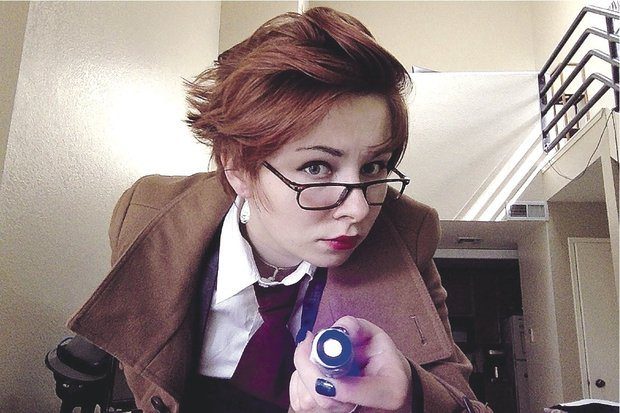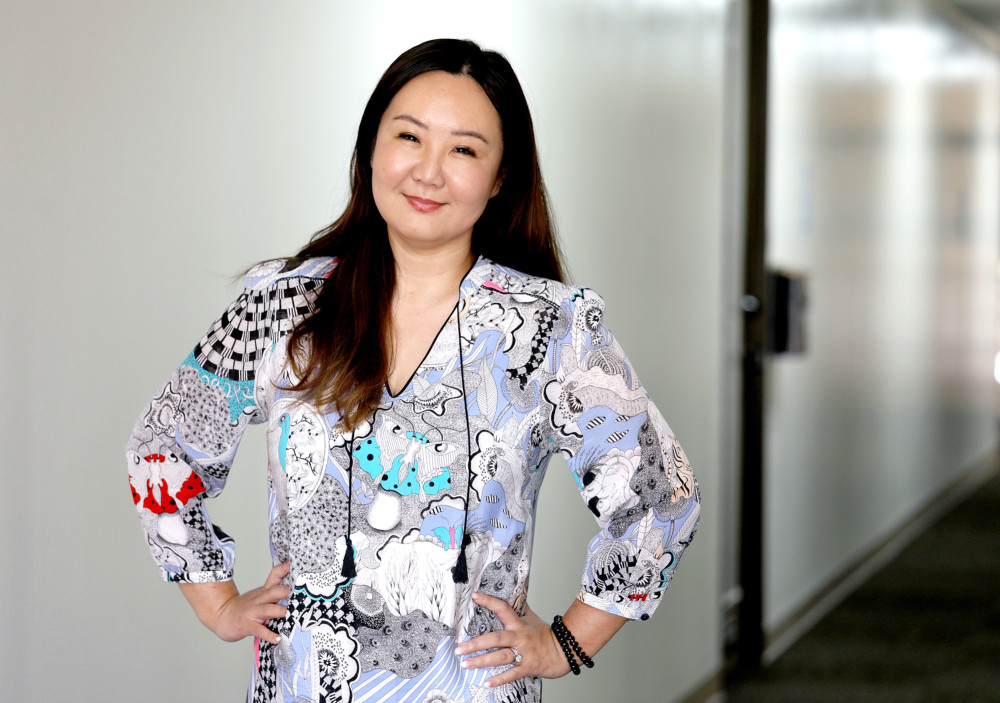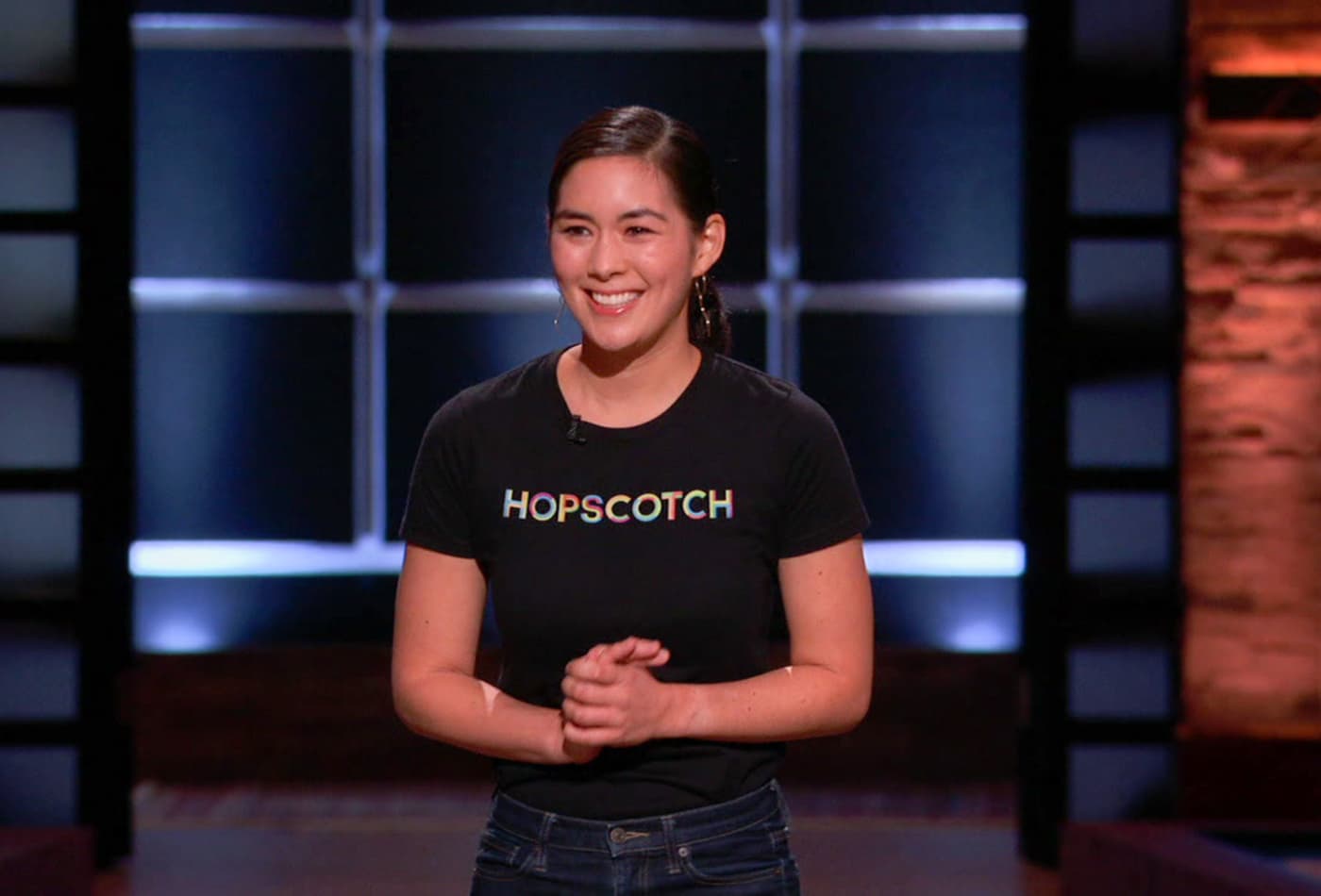By Zach Kyle
The Idaho Statesman.
A smile creeps over Marianna Budnikova’s face as the panel moderator introduces her to the audience by her official title: “Professional Hacker.”
Budnikova takes pride in her programming work at Boise tech firm MetaGeek, which develops troubleshooting software for wireless routers. Her path to that job was unusual: She grew up in a poor family in Podolsk, Russia, and graduated from Boise State University’s undergraduate and master’s computer science programs.
On this day she is back at Boise State’s Student Union Special Events Center as part of a four-person panel to talk about “Harnessing Business for Good.” She is speaking about why she started two Boise nonprofits with a shared mission: to give girls and women the skills and confidence they need to take strides in the Y-chromosome-dominated world of technology.
Budnikova tells the audience of about 75 that she’s driven to make sure women face fewer obstacles breaking into the industry than she did.
“Companies are now missing out on that diversity and that talent,” she says. “I wanted to support other women in my shoes.”
Americans who hear that Budnikova’s mother is a doctor assume she comes from wealth, she told the Statesman. Not so. In Russia, teachers and doctors are among the lowest paid. Her father didn’t make much as a bank security guard, either. “We got hungry a few days before paychecks,” she said.
The family bought its first computer in 2002, when Budnikova was 12. The monitor’s screen was small. The rest was a “big, blobby thing,” a mishmash of refurbished parts.
Budnikova remembers playing “Age of Empires,” a strategy game released five years earlier, because the computer couldn’t handle current, slicker games of the day.
Budnikova played a lot of “Age of Empires” as well as “Disciples: Sacred Lands,” another turn-based game from the ’90s that her cousin gave to her.
She told him once that she wanted to create a video game one day. He laughed her off, saying entire teams of programmers were needed to build games. He was mostly right at the time. Today, Budnikova relishes the reality that a single game developer has enough pre-built tools available to create her own game, by herself.
Back on the panel, the moderator asks Budnikova, “What makes you excited to get up in the morning?”
“I’m excited about social issues because they affect us all,” she says, and begins rattling off statistics.
A SHORTAGE OF WOMEN
Nationwide, women made up 26 percent of professional computing occupations in 2013, according to the National Center for Women & Information Technology, a nonprofit advocacy group.
That percentage used to be higher, especially in programming, said Amy Moll, dean of Boise State’s College of Engineering, which includes the Computer Science Department. Moll set a goal of doubling the number of women in the university’s engineering and computer sciences programs when she took charge in 2011. But female student enrollment has climbed just 1 percentage point in computer science, to 13 percent of the more than 500 students this school year.
“We have a hard time retaining them,” Moll said. “But we also don’t get them in the door. We don’t get them showing interest. That, honestly, is a harder problem.”
The Boise metro area needs computer scientists. In December, companies here posted about 450 openings with the Idaho Department of Labor for positions requiring some level of computer expertise: application development, computer systems analyst, network and systems administrator, and all others designated as “computer occupations.”
Women fill just 20 percent of Treasure Valley tech jobs, the department says.
Budnikova’s boss, MetaGeek founder Ryan Woodings, says tech has a diversity problem. His company began emphasizing hiring women several years ago. As a result, women now make up 40 percent of MetaGeek’s 28 full-time employees.
“The problem with software being a boys club is that numerous studies have shown workforce diversity improves the effectiveness of organizations,” Woodings said.
Budnikova tells the audience that part of the problem is a stereotype that programmers are single men wearing underwear and sitting at computers in basements.
“The media, in a lot of places, shows programmers as nonsocial creatures in a cave,” she says. “I work with those people. That’s not the case. Once we change the perception, a lot more women will go into tech with their ideas to start innovation.”
IN AMERICA, A COLLEGE EDUCATION
Budnikova had never heard of Boise before she learned she would come here as a high school exchange student. She didn’t make the cut the first time she applied.
Only about 10 percent of applicants were selected, she said, and her English was a little rough. She read and wrote well, but her ear for the language was influenced by watching too many British films. So she switched to American films and made “Pirates of the Caribbean” her most frequent study aid. The exchange program accepted her the following year.
Budnikova lived with Maria and Don Essig, a host family, while attending Boise High School for a year. The couple relieved some of the pressure on Budnikova’s bank account by inviting her to continue living there after she enrolled at Boise State University.
Budnikova flirted with pre-med and political science before taking an introductory Java class her junior year. She was one of three women in the class and the only one who ended up pursuing a computer science major. She was usually the only women in her comp sci classes.
Harassment wasn’t a problem, but she didn’t feel like she belonged. She felt like a foreigner in the “geek culture.”
“At some point, I stopped wearing the cute clothes that the women wear so I could fit in,” Budnikova told the Statesman. “I’d wear baggy clothes, baggy T-shirts, not wear makeup, not care about how I looked. A lot of guys do that. But then I realized, no, I cannot do that. I’m a woman. I can own that.”
Though she loved technology, Budnikova said she didn’t have the lexicon and institutional knowledge that comes from growing up an American geek.
In one class — she won’t name the course or the instructor — she felt discouraged to the point of nearly quitting. All of the students were struggling to grasp the material, she said. But she felt like the instructor assumed she would fail and devoted more attention to the male students.
Male instructors are more likely to bond with male students or to internalize the stereotype that women aren’t computer professionals, Moll said. It’s on those instructors to recognize and address those subconscious tendencies. “Part of my job is making sure my faculty, my chairs, that we all think about this, are aware of this and start to build mechanisms for ourselves,” she said.
Said Budnikova: “Another professor was really supportive during that time of crisis, who said, ‘No. You have to stay.’ He was helpful, and he was why I was able to get all of my scholarships. He put in a good word for me.”
ENCOURAGING OTHER WOMEN
In grad school, Budnikova founded the Boise chapter of the Association for Computing Machinery — Women, which organizes workshops for members and holds events open to children as young as 5 to teach computer basics.
In August, she co-founded a Girl Develop It! chapter in Boise. The group hosts affordable classes for women of all ages, teaching a variety of coding and programming skills. Between five and 20 people have signed up for the handful of classes the group has hosted so far at the WaterCooler incubator. Budnikova hopes to expand the courses this year.
The WaterCooler gave Girl Develop It! space and time at no charge because it supports Budnikova’s cause, said Rick Ritter, who overseas the incubator and coaches its tenant companies. Ritter said the tech world could use more people such as Budnikova and chapter co-founders Jane Miceli and Kelsey Suyehira.
“They seem very committed to ‘doing’ rather than talking — unlike other folks in the Treasure Valley,” Ritter said. “I think they can have a real impact over time.”
Budnikova visited Treasure Valley elementary schools for several association events, including in 2013 as part of the national “Hour of Code.” Students learned basic code entries to navigate through simple mazes. She marveled at 7-year-olds showing an almost spooky proclivity to absorb instructions and code their way through the challenges — including girls.
Budnikova thought back to her cousin’s assertion that she couldn’t program a game by herself.
“Now, girls run up to me and say, ‘I want to be a computer programmer,’ ” Budnikova said. “It’s inspirational to see. There’s a lot more interest now.”
Back in the events center, the moderator asks Budnikova why she’s passionate about encouraging women to join tech fields. A little more diversity would go a long way, she says, and cites that 13 percent female enrollment figure in Boise State’s computer-science program.
“That’s a really, really scary statistic,” she says. “Suddenly, our products are developed by a different gender. Business may run into problems because they’re not considering the needs of women. We’re 50 percent of the population. That’s a lot.”

















































































































































































































































































































































































